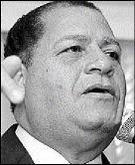Government sides with Opposition over bank rates
Published: Wednesday | September 23, 2009


( L - R ) Audley Shaw, Portia Simpson Miller - file photos
Finance Minister Audley Shaw and Opposition Leader Portia Simpson Miller are certainly at odds over the state of Jamaica's negotiations with the International Monetary Fund (IMF) but, in a rare moment of convergence of views, they have found common ground on the need for commercial banks to cut lending rates.
Simpson Miller used the People's National Party's annual conference on Sunday to call on commercial banks to reduce rates in line with the signals being sent by the central bank, which has shaved 4.5 percentage points off benchmark interest rates since July.
Yesterday, it was Shaw's turn to wade in with a broadside against bankers.
"There is a need, Mr President of the PSOJ and bankers that are in this room, for us to respond to the signals that are being sent," Shaw declared as he addressed a Private Sector Organisation of Jamaica Chairman's Club forum.
"The quicker the banks respond to the signals that are being sent by the Bank of Jamaica (BOJ) is the quicker that the central bank can send further signals," the finance minister said.
"But there is a certain sluggishness that I'm recognising. I don't know what is the reason for the sluggishness."
He said while the Government is committed to lowering interest rates and the central bank would continue to cut rates, the private sector leaders must play their part.
The Government, at the urging of some businesses, have for some time now been nudging the BOJ to slash rates. But in the recent cuts, central bank governor Derick Latibeaudiere has been insistent that the cuts flow from favourable macroeconomic conditions and not from government edicts.
Now, Shaw is showing the Government's impatience with the clear private sector inconsistency over interest rates.
He argued that even when there is agreement with the private sector about the need to reduce rates, government instruments are not embraced by the market unless the interest rates are high.
"It cannot be that when we issue instruments the trading floor is saying we want higher interest rates. We therefore need to have a buy-in to the philosophy of lower interest rates," an obviously exasperated Shaw urged.
The finance minister chided those private sector players who, he said, were requesting lower interest rates on loans while demanding higher rates on government paper.
He announced that a policy of low interest rates will be a key plank of the medium-term programme which the Government is now submitting to the IMF. But this, he said, would present a difficulty if the private sector continues to demand high interest on government instruments.
"We must join the rest of the world in understanding that there is a thing called single-digit interest rates."
The finance minister urged private sector leaders to stop looking at government paper as a sure source of profit, arguing that they should instead return to a culture of production.
arthur.hall@gleanerjm.com


















